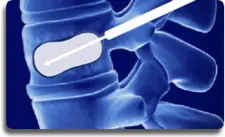Compression Fracture
A vertebral compression fracture refers to a break of the vertebral body of the Thoracic spine (upper back) or Lumbar spine (lower back), and is most commonly caused by weakened bone due to osteoporosis. Most compression fractures result in a loss of more than 20% of the height of the vertebra.
Compression fractures can occur in the course of normal physical activities, without significant accident or injury. When the fracture occurs there is usually a sudden onset of severe back pain.
Compression fractures increases the risk of future vertebral compression fractures at adjacent levels, which can cause significant height loss, spinal deformity (kyphosis, or hunchback).
Treatment
A vertebral compression fracture refers to a break of the vertebral body of the Thoracic spine (upper back) or Lumbar spine (lower back), and is most commonly caused by weakened bone due to osteoporosis. Most compression fractures result in a loss of more than 20% of the height of the vertebra.
Compression fractures can occur in the course of normal physical activities, without significant accident or injury. When the fracture occurs there is usually a sudden onset of severe back pain.
Compression fractures increases the risk of future vertebral compression fractures at adjacent levels, which can cause significant height loss, spinal deformity (kyphosis, or hunchback).
Non-Surgical Care
Non-surgical care is another option and includes wearing a brace for 6-8 weeks until the fracture heals, pain medications and relative rest until slow return to mobility and activity is possible.


